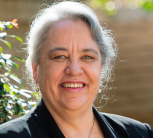

Professor Irma Eloff is a registered educational psychologist and a Professor of Educational Psychology at the University of Pretoria (UP).
She is an alumna of the Universities of Pretoria, Stellenbosch and North-West, and of UP’s Gordon Institute of Business Science. During her undergraduate years, she read Psychology and English at North-West University; she completed her postgraduate studies at UP and her doctorate at Stellenbosch University.
Prof Eloff has been doing research at UP for three decades. Her first appointment at the University was in 1991 as a teaching assistant in Education, followed by a year as research assistant to the Dean while doing her master’s degree in Educational Psychology (then called Orthopedagogics). She also served two terms as Dean of Education at UP.
Prof Eloff says UP is a world leader in the social sciences, which is why she is doing research at the University. “Some of the best minds in education and psychology have walked the UP hallways over the past 50 years,” she says. “UP’s research environment is vibrant, dynamic, diverse, self-critical and future-focused.” She adds that she appreciates UP’s strong push for interdisciplinary knowledge development and the alignment with global agendas for sustainable development.
Her research is primarily within the field of sustainability as it pertains to health and well-being – Sustainable Development Goal (SDG) 3 – and quality education (SDG 4). Agenda 2030 provides a roadmap to create peace and prosperity for people and the planet, and Prof Eloff is happy to align her research to this global agenda.
She leads a team of researchers from Austria and Africa that is exploring the role of teachers in supporting the SDGs. The Teach4Reach project brings together global scholars, researchers, teacher educators, teachers, policymakers and civil society organisations to support Agenda 2030.
In addition, Prof Eloff is involved in exploring increased synergies between education, psychology and malaria research in the Faculty of Health Sciences.
She is a member of the Academy of Science of South Africa, a founding member of the South African Positive Psychology Association, and Chair of the Global Network of Deans of Education. Prof Eloff also founded the African Deans of Education Forum, which is a focal point of the UNESCO International Teacher Task Force.
Prof Eloff has held visiting professorships at the Cape Peninsula University of Technology in Wellington and Rhodes University; Yale University, Fordham University and the University of Wisconsin-Milwaukee in the US; and at Bath Spa University in the UK. In 2018, the University of Innsbruck awarded her the Förderkreis 1669 Wissenschafft Gesellschaft professorship.
She has authored more than 80 scholarly articles and book chapters, and has edited six books. The Handbook of Quality of Life in African Societies, which she edited, was recently published by Springer publications. This volume brought together interdisciplinary research in the critical field of quality of life. It spans contributions from education, psychology, economics and health sciences to food and nutrition, technology and family studies.
Prof Eloff says that she has always been drawn to working with vulnerable populations. In her early doctoral work, she worked with children with disabilities, among others, then with mothers and children affected by HIV/AIDS, and is now involved with well-being research in a variety of groups. “There is much to be learnt from the ways in which human beings deal with adversity, and even more work to be done in terms of creating a world in which everyone has the opportunity to flourish.”
Prof Eloff adds that she takes inspiration from many people in academia: her peers, predecessors, students and especially the next generation of young researchers.
She regards the role of psychology within the domain of education as more important now than at any other point in history. “Multivariate and systemic well-being are integral to optimal learning at all levels of development,” she says. “The research we do on health, well-being and quality of life provides unique insights from the African context – that is why my research matters.”
She advises school learners or undergraduates interested in her field to follow their interests “and to follow the opportunities that arise”.
In her spare time, Prof Eloff enjoys spending time with friends and family, taking pictures and being creative.
 Story
Story
University of Pretoria (UP) researchers have found that the antioxidant content of certain types of tea can be likened to that found in recommended portions of fruit and vegetables.
 Infographic
Infographic
Half a cup of black tea, oolong tea or green tea contained the same amount of antioxidants with radical scavenging capabilities (RSC) as that of a 200mg vitamin C tablet.
 Story
Story
Researchers at the University of Pretoria (UP) may have identified the gene that is responsible for diet-related obesity. By exploring the role of the novel gene Slc7a8, they have made a potential breakthrough in current knowledge about the cellular mechanisms that drive fat accumulation. This understanding is crucial in developing effective treatments.
Copyright © University of Pretoria 2025. All rights reserved.
Get Social With Us
Download the UP Mobile App